英语全球化的影响
英语作为全球语言的地位与影响

英语作为全球语言的地位与影响全球化的进程加速了世界范围内的文化交流和经济往来,为英语的发展和全球化的进程提供了契机。
英语作为全球语言,在国际交流、文化传播、教育、商业和科技等领域中起着举足轻重的作用,对于世界的发展产生着深远的影响。
英语作为全球语言的地位英语成为全球语言的原因是多种多样的。
首先,英国是一个五百年历史的帝国国家,曾经有着广泛的殖民地和海外势力范围。
除此之外,美国作为一个发达国家,在经济、文化、科技等领域中有着无可比拟的影响力。
在经济领域中,英语作为全球语言已成为商业谈判的语言,全球超过50%的商业交流都是通过英语进行的。
这在大幅促进了各地经济的繁荣和发展。
同时,英语也是国际交流和合作的重要工具。
国际组织、政府间会议和峰会等,在交流和商议的过程中,都使用英语作为共同的工作语言。
在文化传播领域,英语同样是不可或缺的。
世界上许多电影,音乐,文学作品都是以英语作为原文,然后再翻译成其他语言传播给全世界。
英语在这些文学作品中的影响力非常大,即使是不说英语的国家,也有许多人在学习英语,以接受文化传播。
此外,许多国际知名的杂志报纸等媒体,也使用英语进行新闻报道和刊物的出版。
在教育领域,英语不仅是西方国家的必修科目,也是世界上许多国家的必修科目之一。
现在,许多国际高校教学语言都是英语,许多学者为了走出自己的国家和更多的人接触,也必须掌握英语这个工具语言。
英语作为全球语言的影响英语作为全球语言的普及,使得文化交流、经济往来、教育合作等领域得以更广泛的开展,使得不同国家的人们能够更加方便的相互交流和合作。
而与此同时,也使得一部分人对英语的掌握和运用竞争力更强。
其实,学习一门语言的目的并不应该是为了成为语言的专家,而是为了更好的交流和沟通。
英语作为全球语言,因此在这个时代对越来越多的人而言,学习英语是一个必要的选择。
学好英语有许多好处,不仅是为了获得更好的求职竞争力,更重要的是在全球化的大环境下,学好英语有利于我们跨越国界、拓展视野,更好地接受外来文化,获得多元的世界观。
英语的全球影响力

英语的全球影响力英语是目前全球使用最广泛的语言之一,拥有超过20亿的使用者,涵盖了几乎各行各业。
从商业到科技,从政治到文化,英语都扮演着至关重要的角色。
有人认为英语是全球化的象征,而有人则认为英语有着独特的影响力,下面将从各个方面具体讨论英语的全球影响力。
英语在商业领域的影响随着全球化的不断推进,英语在商业领域的使用变得越来越普遍。
许多公司不管是在国际市场上还是在国内市场上,都需要使用英语来与客户或供应商进行沟通。
更何况,许多重要的商业会议都是使用英语进行交流的。
在国际贸易中,英语更是扮演着不可或缺的角色。
在国际交易中,通过英语进行谈判和交流是必不可少的,因为它是全球商业贸易的语言。
此外,由于英语的普及和使用者广泛,许多国际组织如世界贸易组织、国际货币基金组织和世界银行等也都采用了英语作为他们的官方语言。
英语在科技领域的影响在科技领域,英语也具有强大的影响力。
由于科技领域的发展速度非常快,研究人员们需要及时地获取最新的研究成果以及相关技术资料。
而许多这方面的信息都是使用英语发表的。
此外,许多科技公司的会议以及科技领域的研讨会都使用英语进行交流和讨论。
另外,随着人工智能等前沿技术的发展,英语蕴含的信息量也变得越来越丰富。
例如,现在的智能语音助手能够听懂和回答英语问题,这使得英语不再只是一种交际工具,而成为了人类和机器进行沟通的桥梁。
英语在教育中的影响英语在教育领域的影响可以说是多此一举了。
在世界各地的学校和大学里,学生们往往都要学习英语作为第二语言。
这是因为英语已经成为了全球最重要的一种语言,学习英语可以帮助他们更好地了解世界,掌握更多的知识以及更广泛的沟通能力。
同时,英语也成为了国际教育和留学的重要一环。
许多国际性的课程和考试如托福、雅思、GRE和GMAT等都是使用英文进行的。
因此,对于想要出国留学或者参加国际课程的人来说,良好的英语水平是必不可少的。
英语在文化领域的影响最后,我们来谈谈英语在文化领域的影响。
英语全球化的产生及影响
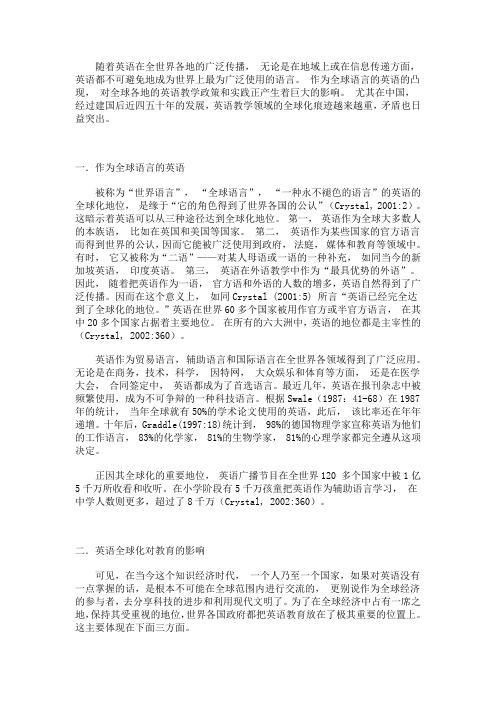
随着英语在全世界各地的广泛传播,无论是在地域上或在信息传递方面,英语都不可避免地成为世界上最为广泛使用的语言。
作为全球语言的英语的凸现,对全球各地的英语教学政策和实践正产生着巨大的影响。
尤其在中国,经过建国后近四五十年的发展,英语教学领域的全球化痕迹越来越重,矛盾也日益突出。
一.作为全球语言的英语被称为“世界语言”,“全球语言”,“一种永不褪色的语言”的英语的全球化地位,是缘于“它的角色得到了世界各国的公认”(Crystal, 2001:2)。
这暗示着英语可以从三种途径达到全球化地位。
第一,英语作为全球大多数人的本族语,比如在英国和美国等国家。
第二,英语作为某些国家的官方语言而得到世界的公认,因而它能被广泛使用到政府,法庭,媒体和教育等领域中。
有时,它又被称为“二语”——对某人母语或一语的一种补充,如同当今的新加坡英语,印度英语。
第三,英语在外语教学中作为“最具优势的外语”。
因此,随着把英语作为一语,官方语和外语的人数的增多,英语自然得到了广泛传播。
因而在这个意义上,如同Crystal (2001:5) 所言“英语已经完全达到了全球化的地位。
”英语在世界60多个国家被用作官方或半官方语言,在其中20多个国家占据着主要地位。
在所有的六大洲中,英语的地位都是主宰性的(Crystal, 2002:360)。
英语作为贸易语言,辅助语言和国际语言在全世界各领域得到了广泛应用。
无论是在商务,技术,科学,因特网,大众娱乐和体育等方面,还是在医学大会,合同签定中,英语都成为了首选语言。
最近几年,英语在报刊杂志中被频繁使用,成为不可争辩的一种科技语言。
根据Swale(1987:41-68)在1987年的统计,当年全球就有50%的学术论文使用的英语,此后,该比率还在年年递增。
十年后,Graddle(1997:18)统计到, 98%的德国物理学家宣称英语为他们的工作语言, 83%的化学家, 81%的生物学家, 81%的心理学家都完全遵从这项决定。
英语对世界的影响

英语对世界的影响英语作为一种全球性的语言,对世界产生了深远的影响。
从政治、经济、文化、教育等方面来看,英语已经成为了一种重要的交流工具,改变了世界各地的人们的生活方式和工作方式。
本文将从以下几个方面探讨英语对世界的影响。
一、政治影响英语作为国际官方语言之一,在政治领域的影响力不容忽视。
在全球化的背景下,英语成为了国际交流和合作的重要工具,促进了各国之间的政治交流和合作。
同时,英语也成为了一些国际组织和工作场所的官方语言,如联合国、世界贸易组织、国际货币基金组织等。
这些机构的工作语言主要以英语为主,使得英语成为了一种重要的政治工具,对全球政治格局产生了深远的影响。
二、经济影响英语在经济发展中也扮演着重要的角色。
随着全球化进程的加速,英语已成为国际贸易和投资的重要语言。
许多国家的商业文件、合同、协议等都需要使用英语进行书写和交流,这为英语提供了广泛的应用场景。
同时,英语教育也在全球范围内得到了广泛普及,这为经济发展提供了人才支持。
许多国家都把英语教育作为一项重要的国策,旨在培养具有国际视野和跨文化交流能力的人才,以适应全球化背景下的经济发展需求。
三、文化影响英语作为全球性的语言,对文化交流和传播产生了深远的影响。
随着英语的普及,各种文化元素也逐渐融入到了英语中,如音乐、电影、文学作品等。
这些文化元素在全球范围内得到了广泛的传播和交流,促进了不同文化之间的相互理解和融合。
同时,英语也成为了一种重要的文化载体,通过英语电影、音乐、文学作品等传播到了世界各地,丰富了人们的精神生活。
四、教育影响英语在教育领域的影响也是不可忽视的。
在全球范围内,许多国家都将英语作为主要的教学语言之一,这为培养具有国际视野和跨文化交流能力的人才提供了重要的支持。
通过英语教学,学生们可以接触到更广泛的知识和文化,增强自己的综合素质和竞争力。
同时,英语教育也促进了不同国家之间的教育交流和合作,为全球教育的发展提供了动力。
总之,英语对世界的影响是深远的。
全球化的影响高中英语作文
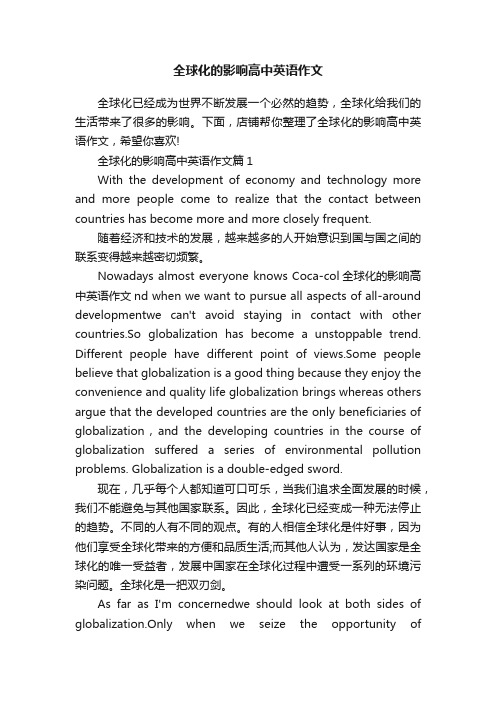
全球化的影响高中英语作文全球化已经成为世界不断发展一个必然的趋势,全球化给我们的生活带来了很多的影响。
下面,店铺帮你整理了全球化的影响高中英语作文,希望你喜欢!全球化的影响高中英语作文篇1With the development of economy and technology more and more people come to realize that the contact between countries has become more and more closely frequent.随着经济和技术的发展,越来越多的人开始意识到国与国之间的联系变得越来越密切频繁。
Nowadays almost everyone knows Coca-col全球化的影响高中英语作文nd when we want to pursue all aspects of all-around developmentwe can't avoid staying in contact with other countries.So globalization has become a unstoppable trend. Different people have different point of views.Some people believe that globalization is a good thing because they enjoy the convenience and quality life globalization brings whereas others argue that the developed countries are the only beneficiaries of globalization,and the developing countries in the course of globalization suffered a series of environmental pollution problems. Globalization is a double-edged sword.现在,几乎每个人都知道可口可乐,当我们追求全面发展的时候,我们不能避免与其他国家联系。
全球化对我们的影响英语作文
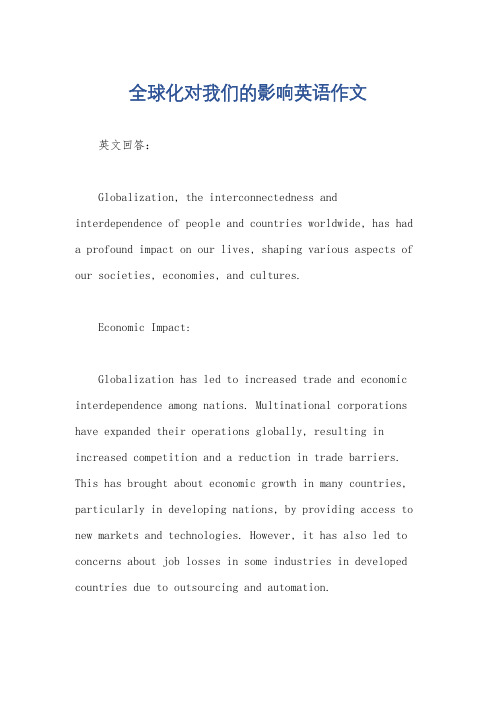
全球化对我们的影响英语作文英文回答:Globalization, the interconnectedness and interdependence of people and countries worldwide, has had a profound impact on our lives, shaping various aspects of our societies, economies, and cultures.Economic Impact:Globalization has led to increased trade and economic interdependence among nations. Multinational corporations have expanded their operations globally, resulting in increased competition and a reduction in trade barriers. This has brought about economic growth in many countries, particularly in developing nations, by providing access to new markets and technologies. However, it has also led to concerns about job losses in some industries in developed countries due to outsourcing and automation.Socio-Cultural Impact:Globalization has facilitated the exchange of ideas, culture, and values across borders. The increased movement of people and the accessibility of information through the internet have brought diverse cultures closer together. This has led to increased understanding and appreciation of different perspectives and lifestyles, promoting cross-cultural dialogue and tolerance. However, it has also raised concerns about cultural homogenization and the loss of local traditions and identities.Political Impact:Globalization has influenced the political landscape, leading to the rise of international organizations and global governance. International cooperation has become increasingly important in addressing global challenges such as climate change, terrorism, and economic crises. However, concerns have been raised about the democratic deficit in global institutions and the potential for powerful nations to dominate decision-making processes.Environmental Impact:Globalization has had significant implications for the environment. Increased trade and consumption have led to increased resource depletion and pollution. The global transportation of goods contributes to greenhouse gas emissions, while the extraction of raw materials from developing countries can damage local ecosystems. Globalization has also created opportunities for international cooperation to address environmental issues, but it requires coordinated efforts to mitigate the negative impact on the planet.Overall Conclusion:Globalization is a complex phenomenon with bothpositive and negative consequences. It has driven economic growth, facilitated cultural exchange, and heightened political cooperation. However, it has also raised concerns about economic inequality, cultural loss, democratic deficits, and environmental degradation. Navigating thechallenges and maximizing the opportunities of globalization requires a balanced approach that addresses the diverse impacts across countries and sectors.中文回答:全球化的影响。
全球化的影响英语作文
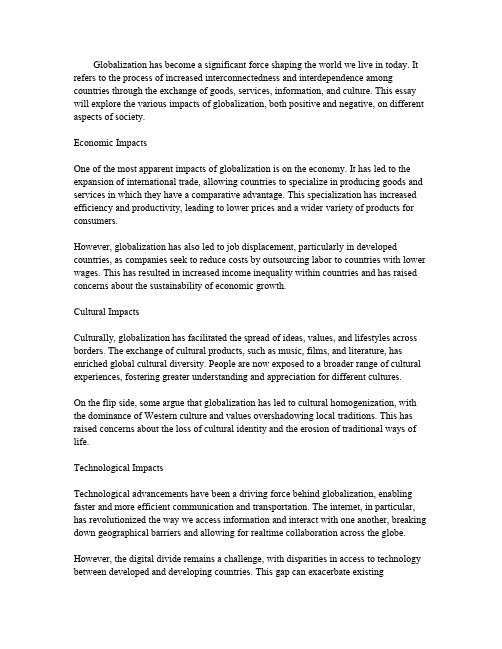
Globalization has become a significant force shaping the world we live in today.It refers to the process of increased interconnectedness and interdependence among countries through the exchange of goods,services,information,and culture.This essay will explore the various impacts of globalization,both positive and negative,on different aspects of society.Economic ImpactsOne of the most apparent impacts of globalization is on the economy.It has led to the expansion of international trade,allowing countries to specialize in producing goods and services in which they have a comparative advantage.This specialization has increased efficiency and productivity,leading to lower prices and a wider variety of products for consumers.However,globalization has also led to job displacement,particularly in developed countries,as companies seek to reduce costs by outsourcing labor to countries with lower wages.This has resulted in increased income inequality within countries and has raised concerns about the sustainability of economic growth.Cultural ImpactsCulturally,globalization has facilitated the spread of ideas,values,and lifestyles across borders.The exchange of cultural products,such as music,films,and literature,has enriched global cultural diversity.People are now exposed to a broader range of cultural experiences,fostering greater understanding and appreciation for different cultures.On the flip side,some argue that globalization has led to cultural homogenization,with the dominance of Western culture and values overshadowing local traditions.This has raised concerns about the loss of cultural identity and the erosion of traditional ways of life.Technological ImpactsTechnological advancements have been a driving force behind globalization,enabling faster and more efficient communication and transportation.The internet,in particular, has revolutionized the way we access information and interact with one another,breaking down geographical barriers and allowing for realtime collaboration across the globe.However,the digital divide remains a challenge,with disparities in access to technology between developed and developing countries.This gap can exacerbate existinginequalities and limit the potential benefits of globalization for certain populations.Environmental ImpactsGlobalization has also had significant environmental implications.The increased movement of goods across borders has led to higher levels of pollution and carbon emissions.The demand for resources has put pressure on ecosystems and contributed to deforestation and biodiversity loss.Conversely,globalization can also promote the spread of sustainable practices and technologies,as countries learn from one another and adopt more environmentally friendly approaches to development.Political ImpactsPolitically,globalization has led to the formation of international organizations and agreements aimed at addressing global challenges,such as climate change and economic stability.These collaborations can foster a sense of global community and shared responsibility.However,globalization has also been criticized for undermining national sovereignty,as decisions made by international bodies can sometimes override domestic policies.This has sparked debates about the balance between global cooperation and national autonomy. ConclusionIn conclusion,globalization is a complex and multifaceted phenomenon that has farreaching implications for economies,cultures,technologies,environments,and politics. While it offers numerous opportunities for growth and exchange,it also presents challenges that must be carefully managed to ensure equitable and sustainable outcomes for all.As we continue to navigate this interconnected world,it is crucial to consider both the benefits and the drawbacks of globalization to shape a more inclusive and harmonious global community.。
英语的全球化及其影响-教育文档
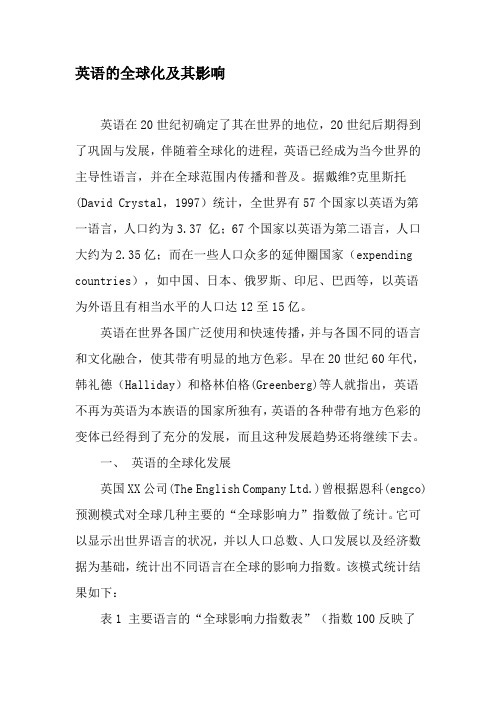
英语的全球化及其影响英语在20世纪初确定了其在世界的地位,20世纪后期得到了巩固与发展,伴随着全球化的进程,英语已经成为当今世界的主导性语言,并在全球范围内传播和普及。
据戴维?克里斯托(David Crystal,1997)统计,全世界有57个国家以英语为第一语言,人口约为3.37 亿;67个国家以英语为第二语言,人口大约为2.35亿;而在一些人口众多的延伸圈国家(expending countries),如中国、日本、俄罗斯、印尼、巴西等,以英语为外语且有相当水平的人口达12至15亿。
英语在世界各国广泛使用和快速传播,并与各国不同的语言和文化融合,使其带有明显的地方色彩。
早在20世纪60年代,韩礼德(Halliday)和格林伯格(Greenberg)等人就指出,英语不再为英语为本族语的国家所独有,英语的各种带有地方色彩的变体已经得到了充分的发展,而且这种发展趋势还将继续下去。
一、英语的全球化发展英国XX公司(The English Company Ltd.)曾根据恩科(engco)预测模式对全球几种主要的“全球影响力”指数做了统计。
它可以显示出世界语言的状况,并以人口总数、人口发展以及经济数据为基础,统计出不同语言在全球的影响力指数。
该模式统计结果如下:表1 主要语言的“全球影响力指数表”(指数100反映了英语在1995年的状况)由此模式可以看出,英语作为全球性语言具有无可替代的位置。
英语已成为通用的语言使得无论在上海工作的韩国主管,在布鲁塞尔制定法律的欧盟的德国籍官员,还是在瑞典开会的巴西生物学家都可能讲英语。
英语在全世界各个领域被广泛应用,包括政治、经济、贸易、文化、外交、旅游、通讯、自然科学和人文科学的学术研究等。
据统计,目前世界上有60多个国家把英语作为官方语言,85%的国际组织把英语列为通用语言(联合国、欧盟等),75%的邮件是用英语写的,80%的出版物和互联网信息是用英语出版和发布的,100%的软件源代码是英语格式。
全球化对经济的影响高中生英语作文
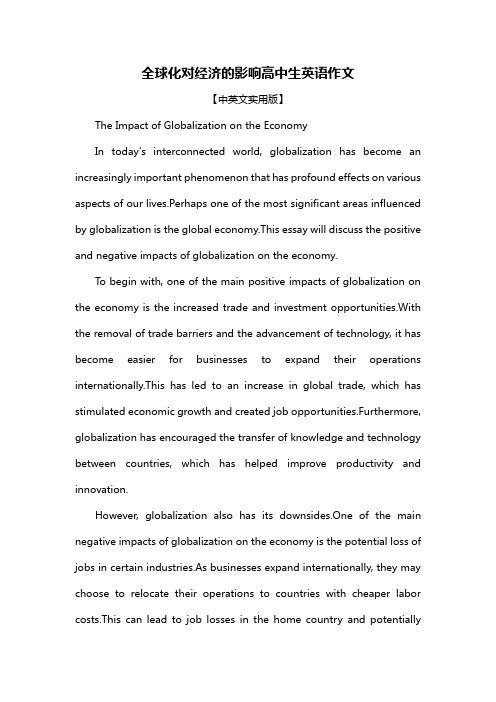
全球化对经济的影响高中生英语作文【中英文实用版】The Impact of Globalization on the EconomyIn today's interconnected world, globalization has become an increasingly important phenomenon that has profound effects on various aspects of our lives.Perhaps one of the most significant areas influenced by globalization is the global economy.This essay will discuss the positive and negative impacts of globalization on the economy.To begin with, one of the main positive impacts of globalization on the economy is the increased trade and investment opportunities.With the removal of trade barriers and the advancement of technology, it has become easier for businesses to expand their operations internationally.This has led to an increase in global trade, which has stimulated economic growth and created job opportunities.Furthermore, globalization has encouraged the transfer of knowledge and technology between countries, which has helped improve productivity and innovation.However, globalization also has its downsides.One of the main negative impacts of globalization on the economy is the potential loss of jobs in certain industries.As businesses expand internationally, they may choose to relocate their operations to countries with cheaper labor costs.This can lead to job losses in the home country and potentiallycause social and economic instability.Additionally, globalization can also lead to income inequality, as the benefits of globalization may not be distributed equally among all individuals and groups.In conclusion, globalization has had a significant impact on the global economy.While it has created new opportunities for trade and investment, it has also posed challenges such as job losses and income inequality.It is important for governments and policymakers to address these challenges and work towards creating a more balanced and inclusive global economy.中文翻译:在今天相互联系的世界中,全球化已经成为一个越来越重要的现象,对我们的生活有着深远的影响。
全球化的影响 Impact of Globalization 英语作文

Impact of Globalization>Impact of Globalization Essay:Since the decline of communalism, Globalization has become one of the most controversial and debating issues among people around the World. Globalization has a different definition to different people, and whether it has a positive impact today or was better for yesterday is still questionable. Although a part of the population questions its existence, it has significantly impacted both developed and developing countries’ economies. Globalization cannot simply be related to being political as ithas had significant effects on cultural, ideological, and social aspects of people around the World.To understand the impact of Globalization, it is important to know what it is. One of the popular political scientist, James Rosenau, described the term as a currently popular label and accounted for people’s norms, goods, ideas, services, activities, and currencies that are localized and practiced in a confined area. As per World Health Organization, Globalization is defined as the interdependence and interconnection of people in a local place with the people aroundthe World. The two main elements that need to work here is the ease of flow of goods, services, and activities of people from one place to another and the incorporation and change in policies that allow the easy flow of exchange around the areas.Worldwide InterdependenceGlobalization is a complex procedure that includes the trends and tendencies of the economic, cultural, and social spheres of the people and places around the World. The process is huge and not easily predictable but organized as well. The liberation of investmentand trade, Social networks worldwide, technological innovation, and entrepreneurship are the four major factors of Globalization.Many political scientists believe that the two major forces that make Globalization effective are technological innovation and entrepreneurship. However, it is impossible to prove that the process works without the intervention of other factors. With the adoption and evolution of market-related laws and policies in local and international fields, the governments have played a significant role by allowing economic integration of specialactivities and giving major independence to welcome the outside World. Globalization’s financial aspect is the major force that acts as a driving agent for both the political and social parts. Due to the colonization by Europe in various countries, some of the practices and cultural lifestyle is adopted by the people deep inside the African villages.Globalization Plays a Role in the Worldwide DevelopmentGlobalization has made way for the countries to develop rapidly. However, the development is not even because some countries are growingquickly in comparison to others. The interconnection between the countries helped decrease poverty, but it does not equally support global community members. The developing countries lie in a depriving position while the developed countries enjoy all the interconnection benefits. However, when we take a close look at the impact of Globalization worldwide, we can conclude that it has both positive and negative effects on both developed and developing countries.Globalization has proven to make a positive impact on the quality of life of people indeveloping countries. Funding from foreign countries and industrialized nations are helping many developing countries to decrease poverty. These funds are spent on improving the social, health, transport structure, and education of developing countries, helping them with a standard of living.Today, the developing countries can openly communicate and trade through transport, labor, technology, management, and other benefits from other industrialized countries.The impact of Globalization around the WorldGlobalization has its backdrops that dually affect both the developed and developing countries. However, considering the positive side to be heavier, people still believe it to be beneficial and aim for a better standard of living for all the poor people around the Globe.World Trade and GlobalizationzAccording to political scientists, the impact of Globalization and trade on developing countries and industrialized countries is obvious that has a positive impact on the economic development of the nations. However, economic progress is not possible if the member countries andgovernments do not allow free trade flow without any limitations. The liberalization of trade will help the free flow of goods and services with an increasing profit to the producer country and the export countries. In the past decade, Uganda has proven to improve its economic situation by allowing free trade flow and restricting laws.Trade is emerging as a trend in various underdeveloped and developing countries. With the reducing restrictions of trade, labor requirement and demand of manufacturers has risen. Many such industrialists migrate their business and production to developing countries,increasing employment and wealth among poor people. The hosting countries get several benefits from such a situation. Firstly, increase in employment opportunities as a lot of labor and workforce is required in industries. Import of new technology automatically activates with the welcome of new foreign sectors. Therefore, training local employees gives another opportunity for employment for the hosting countries. Often these foreign industries distribute their work and machine factories in various other countries and states. In such cases, the widespread chance of employment paves the way for Globalization.Globalization Increases Competition Among CountriesWith the increase in creativity and innovation, local and Global competition is an automatic result of Globalization. The competition among the producers ensures the quality of the product and the efficiency of producing goods. One of the major positive effects of Globalization is access to foreign interests, culture, and entertainment via music, movies, apparel, and television broadcasts. The cooperation among the government officials and the focus on similar goals has helped distribute knowledge amongdifferent underprivileged countries. With Globalization, the news and another kind of interactions can be done faster than expected.However, with numerous positive effects of Globalization, there are several negative impacts as well, which the critics put together to criticize the concept in developing countries. According to reports of 2004, Globalization’s negative impact has no greater examples than countries like China and India.Negative Impact of Globalization on Developing CountriesAccording to political scientists, the major negative impact of Globalization is poverty. Although it is said to have decreased poverty in developing countries, the Secretary-General of the United Nations, Kofi Annan, says that only a few countries are enjoying Globalization’s benefits. In contrast, most developing countries are left behind in the dark. It is not possible to evaluate the effect of Globalization on poverty. However, according to a survey, Sub Saharan Africa shows increased poverty by eighty-two million, central Asia and Europe by fourteen million, and the Caribbean and Latin America by eight million. However, Globalization alone is notresponsible for poverty in developing countries, weak reforms, governance, lack of economic policies and ideas. Like Zygmunt Bauman, popular political figures claimed that Globalization makes the industrialized countries rich and the poor developing countries poorer.Globalization helped several African colonies; however, today, most of them are dependent on large wealthy countries over the years. The African colonies are known for their largely consuming economy. The weak agricultural practice and growth make the overall economy worse in Africa. With the decline of trade andimport facilities in the late 90s, the region’s per capita income has slowly reduced. The survey of social and economic conditions of Africa has an external debt of a million dollars.Impact of Globalization on Health and DiseasesGlobalization has made a serious impact on the hygiene of infectious and deadly diseases. It has given the developing countries the opportunity to restraint, prevent and eradicate the infection quickly. The reason why deadly diseases are increasing worldwide is because of the technological challenges that led to the increase of harmful emissions, resulting in global warming.The increase in mosquito breeding in open waters, bathing in pools, and other ways to be contaminated with the Schistosoma’s larvae might result in harmful diseases. With the use of western diets in developing countries, food-related diseases started increasing in the long run.The western style that took place through Globalization has led the adults and the youth to lose their core values leading to several diseases like AIDS or HIV that have a long-term effect on the country’s society and economy. Before the liberalization came into practice, thecoffee farmers of Uganda had a Coffee Marketing Board organized by the Government that worked as a middle man between the farmers and the foreign buyers. Even though the farmer’s infrastructure cost was to be paid, they were assured of a standard price. However, with the introduction of Globalization, Coffee making board was abolished, and the farmers had to shelter in the unpredictability of the world market.Impact of Globalization on EmploymentWith the introduction of Globalization, the structure of employment opportunities in developing nations has taken a turn. Before theinception of Globalization, the main source of occupation and economy in developing countries was based on agriculture among both men and women. With the introduction of foreign industrial corporations, the section of people has shifted their occupation from agriculture and joined industries as laborers required for mass production. This led to a small scale of people working in the fields. Evidence shows the decrease of male workers in agricultural areas by sixty-two percent and the female workers by fourteen percent. The increasing unstable income and unemployment with no guarantee oftheir future result from the employment structure in the developing countries.Globalization has led to mass unemployment as multinational companies outsource their services. The three main changes that Globalization leads people to are the changes in their income as laborers, changes in prices, and household production-consumption. Before Globalization, there was a difference between skilled and unskilled laborers. However, with serialization, the demand for educated workers gradually increased in the developing countries. Among several debates, the only conclusion found to besimilar is that there has been the development of inequalities with Globalization in developing nations.Impact of Globalization on Cultural BoundariesBefore Globalization came into existence, the native countries had their own culture and practices. It leads to the extinction of various native languages in developing countries. Today, people are keen to learn the common language around the Globe, English, and thus, the cessation of languages is taking place rapidly. The blend of western and local culture has led to the declination of cultural barriers, which has ledpeople’s individuality and culture to fade away. The imbibing of extremist ideas and adaptation of multiple cultures has led to multiculturalism, causing terrorist attacks and suicide terrorism in countries like Sudan, Egypt, Tunisia, Somalia,The free trade areas in the developing countries that welcome the foreign investors have turned to adapt more negative points than positives. The female workers of factories are physically and verbally abused to keep up with the foreign industrialists’ production demands, as mentioned in 2003, “The Hidden Face of Globalization”. To maximize production andprofit, many multinational companies avoid maintaining a secure and safe environment for their workers. The Philco Ford assembly plant in Taiwan was recorded to kill twelve female workers due to toxic fumes. All these are also leading to a toxic environment harming the eco-friendly areas of the developing countries. Other than these, human trafficking, cheap labor, and other illegal practices are also a result of Globalization.Impact of Globalization Essay ConclusionGlobalization is a complex procedure that is currently the topic of debate around the World.Since it has both positive and negative impacts on the developed and developing countries, many countries face economic wrath and a serious lack of growth and development. It is the leaders of developed countries’ responsibility to take measures and try to remove poverty from the developing countries and improve their style of living. Imposing various rational laws and reforms for a better guide of liberalization will help the developing countries. All the developing countries must get equal opportunities rather than focusing on a few countries to develop into a better country both in economy and health.。
论英语全球化传播的原因及其影响

4、创造新的文化现象
电视谈话节目可以创造新的文化现象。随着社会的多元化和文化的多样性,人 们对于新事物和新现象的度不断提高。电视谈话节目可以通过讨论各种社会热 点和事件来引领社会的文化思潮,创造新的文化现象。这种文化现象不仅可以 吸引更多的观众,还可以推动社会的进步和发展。
总之,电视谈话节目的传播特点和兴盛原因充分体现了其价值和意义。通过满 足观众需求、增强社会互动性、提高媒体影响力和创造新的文化现象,电视谈 话节目成为了当代社会中不可或缺的一部分。在未来,随着媒体技术的不断发 展和人们需求的不断变化,电视谈话节目将会继续发挥其重要作用,为人们提 供更多有价值的信息和观点。
4、具有强烈的现场感,使受众 有身临其境之感
电视谈话节目的现场感是其一大特点。通过现场的氛围和嘉宾的表现,观众能 够更好地感受到节目所传达的情感和信息。同时,现场的互动环节也可以让观 众参与到节目中来,增强了观众的参与感和体验感。
二、电视谈话节目的兴盛原因
1、满足观众需求
电视谈话节目能够满足观众对信息和观点的需求。随着社会的快速发展,人们 对于各种社会现象和事件的度不断提高。电视谈话节目通过提供最新的信息和 深入的分析,满足了观众对于信息和观点的需求。
英语作为全球通用语言的优势在于其简单易学、词汇量大、语法结构相对简单。 此外,英语还具有高度的表达能力和灵活性,可以用来描述各种概念、事物和 现象。这些特点使得英语成为许多国家和地区的人们首选的学习语言。
3、技术支持
近年来,互联网、大数据和人工智能等技术的迅速发展为英语全球化传播提供 了强有力的支持。互联网使得人们可以轻松地获取和分享信息,而大数据和人 工智能则可以帮助人们更快速、准确地处理和分析语言信息。这些技术的应用 为英语教育、翻译和跨文化交流提供了便利,进一步推动了英语的全球化传播。
全球化的影响高中英语作文
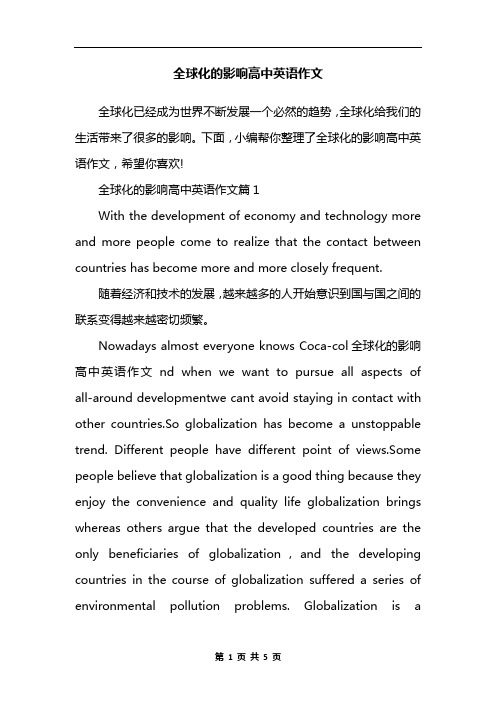
全球化的影响高中英语作文全球化已经成为世界不断发展一个必然的趋势,全球化给我们的生活带来了很多的影响。
下面,小编帮你整理了全球化的影响高中英语作文,希望你喜欢!全球化的影响高中英语作文篇1With the development of economy and technology more and more people come to realize that the contact between countries has become more and more closely frequent.随着经济和技术的发展,越来越多的人开始意识到国与国之间的联系变得越来越密切频繁。
Nowadays almost everyone knows Coca-col全球化的影响高中英语作文nd when we want to pursue all aspects of all-around developmentwe cant avoid staying in contact with other countries.So globalization has become a unstoppable trend. Different people have different point of views.Some people believe that globalization is a good thing because they enjoy the convenience and quality life globalization brings whereas others argue that the developed countries are the only beneficiaries of globalization,and the developing countries in the course of globalization suffered a series of environmental pollution problems. Globalization is adouble-edged sword.现在,几乎每个人都知道可口可乐,当我们追求全面发展的时候,我们不能避免与其他国家联系。
全球化对学生的影响英语作文
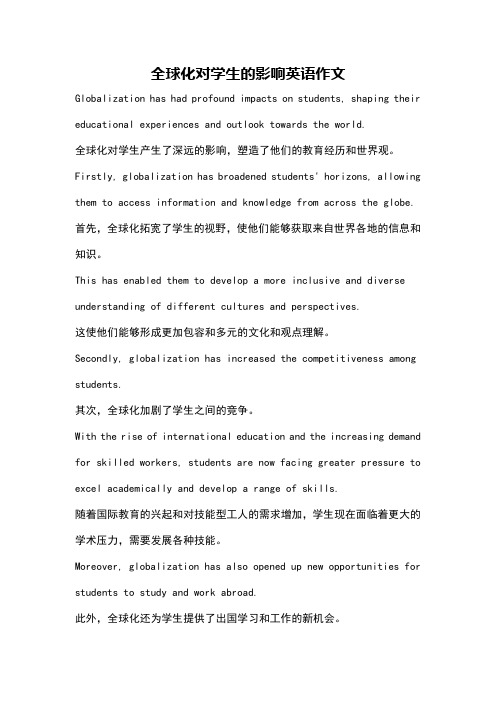
全球化对学生的影响英语作文Globalization has had profound impacts on students, shaping their educational experiences and outlook towards the world.全球化对学生产生了深远的影响,塑造了他们的教育经历和世界观。
Firstly, globalization has broadened students' horizons, allowing them to access information and knowledge from across the globe. 首先,全球化拓宽了学生的视野,使他们能够获取来自世界各地的信息和知识。
This has enabled them to develop a more inclusive and diverse understanding of different cultures and perspectives.这使他们能够形成更加包容和多元的文化和观点理解。
Secondly, globalization has increased the competitiveness among students.其次,全球化加剧了学生之间的竞争。
With the rise of international education and the increasing demand for skilled workers, students are now facing greater pressure to excel academically and develop a range of skills.随着国际教育的兴起和对技能型工人的需求增加,学生现在面临着更大的学术压力,需要发展各种技能。
Moreover, globalization has also opened up new opportunities for students to study and work abroad.此外,全球化还为学生提供了出国学习和工作的新机会。
英语全球化的意义和启示
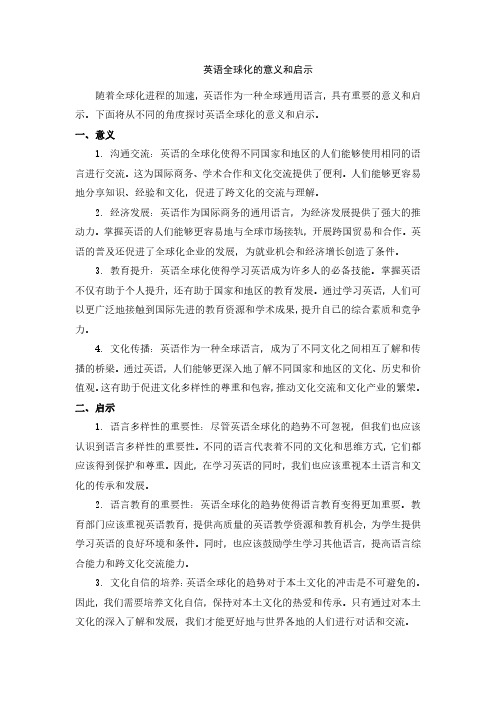
英语全球化的意义和启示随着全球化进程的加速,英语作为一种全球通用语言,具有重要的意义和启示。
下面将从不同的角度探讨英语全球化的意义和启示。
一、意义1.沟通交流:英语的全球化使得不同国家和地区的人们能够使用相同的语言进行交流。
这为国际商务、学术合作和文化交流提供了便利。
人们能够更容易地分享知识、经验和文化,促进了跨文化的交流与理解。
2.经济发展:英语作为国际商务的通用语言,为经济发展提供了强大的推动力。
掌握英语的人们能够更容易地与全球市场接轨,开展跨国贸易和合作。
英语的普及还促进了全球化企业的发展,为就业机会和经济增长创造了条件。
3.教育提升:英语全球化使得学习英语成为许多人的必备技能。
掌握英语不仅有助于个人提升,还有助于国家和地区的教育发展。
通过学习英语,人们可以更广泛地接触到国际先进的教育资源和学术成果,提升自己的综合素质和竞争力。
4.文化传播:英语作为一种全球语言,成为了不同文化之间相互了解和传播的桥梁。
通过英语,人们能够更深入地了解不同国家和地区的文化、历史和价值观。
这有助于促进文化多样性的尊重和包容,推动文化交流和文化产业的繁荣。
二、启示1.语言多样性的重要性:尽管英语全球化的趋势不可忽视,但我们也应该认识到语言多样性的重要性。
不同的语言代表着不同的文化和思维方式,它们都应该得到保护和尊重。
因此,在学习英语的同时,我们也应该重视本土语言和文化的传承和发展。
2.语言教育的重要性:英语全球化的趋势使得语言教育变得更加重要。
教育部门应该重视英语教育,提供高质量的英语教学资源和教育机会,为学生提供学习英语的良好环境和条件。
同时,也应该鼓励学生学习其他语言,提高语言综合能力和跨文化交流能力。
3.文化自信的培养:英语全球化的趋势对于本土文化的冲击是不可避免的。
因此,我们需要培养文化自信,保持对本土文化的热爱和传承。
只有通过对本土文化的深入了解和发展,我们才能更好地与世界各地的人们进行对话和交流。
4.互相学习与交流:英语全球化使得不同国家和地区的人们更容易进行互相学习和交流。
全球化的影响 英语作文
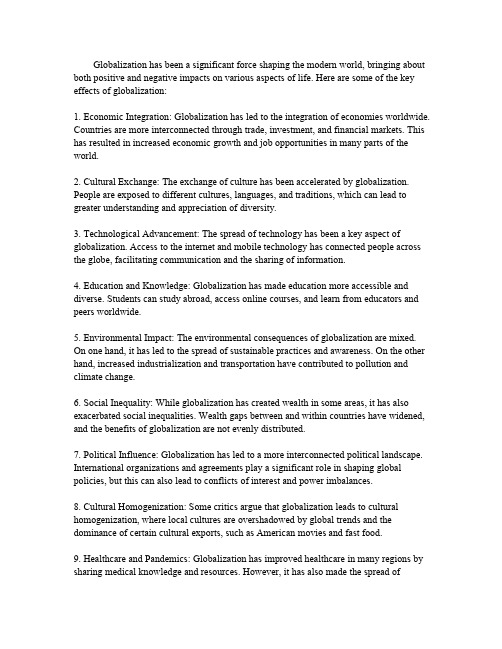
Globalization has been a significant force shaping the modern world,bringing about both positive and negative impacts on various aspects of life.Here are some of the key effects of globalization:1.Economic Integration:Globalization has led to the integration of economies worldwide. Countries are more interconnected through trade,investment,and financial markets.This has resulted in increased economic growth and job opportunities in many parts of the world.2.Cultural Exchange:The exchange of culture has been accelerated by globalization. People are exposed to different cultures,languages,and traditions,which can lead to greater understanding and appreciation of diversity.3.Technological Advancement:The spread of technology has been a key aspect of globalization.Access to the internet and mobile technology has connected people across the globe,facilitating communication and the sharing of information.cation and Knowledge:Globalization has made education more accessible and diverse.Students can study abroad,access online courses,and learn from educators and peers worldwide.5.Environmental Impact:The environmental consequences of globalization are mixed. On one hand,it has led to the spread of sustainable practices and awareness.On the other hand,increased industrialization and transportation have contributed to pollution and climate change.6.Social Inequality:While globalization has created wealth in some areas,it has also exacerbated social inequalities.Wealth gaps between and within countries have widened, and the benefits of globalization are not evenly distributed.7.Political Influence:Globalization has led to a more interconnected political landscape. International organizations and agreements play a significant role in shaping global policies,but this can also lead to conflicts of interest and power imbalances.8.Cultural Homogenization:Some critics argue that globalization leads to cultural homogenization,where local cultures are overshadowed by global trends and the dominance of certain cultural exports,such as American movies and fast food.9.Healthcare and Pandemics:Globalization has improved healthcare in many regions by sharing medical knowledge and resources.However,it has also made the spread ofdiseases like COVID19more rapid and widespread.10.Migration and Labor:The movement of people across borders has increased due to globalization.This has led to a more diverse workforce but also to debates about immigration policies and the rights of migrant workers.In conclusion,globalization is a complex phenomenon with farreaching implications.It offers opportunities for growth and cultural exchange but also presents challenges that need to be managed to ensure equitable outcomes for all.。
全球化影响的利弊英语作文

全球化影响的利弊英语作文Globalization has both positive and negative impacts on the world today. 全球化对当今世界产生了正面和负面影响。
On one hand, it has connected people from all over the world through increased communication and exchange of ideas. 一方面,全球化通过增加沟通和思想交流,连接了来自世界各地的人们。
This has led to a better understanding of different cultures and perspectives. 这导致了对不同文化和观点的更好理解。
Globalization has also promoted economic growth and lifted many people out of poverty. 全球化还促进了经济增长,使许多人摆脱了贫困。
However, it has also led to the homogenization of cultures and the loss of local traditions. 然而,它也导致了文化同质化和当地传统的丧失。
One of the benefits of globalization is the increased access to information and technology. 全球化的一个好处是增加了对信息和技术的获取。
People can now easily connect with others from different countries and share knowledge and ideas. 人们现在可以轻松地与来自不同国家的人联系,并分享知识和思想。
全球化的影响英语作文
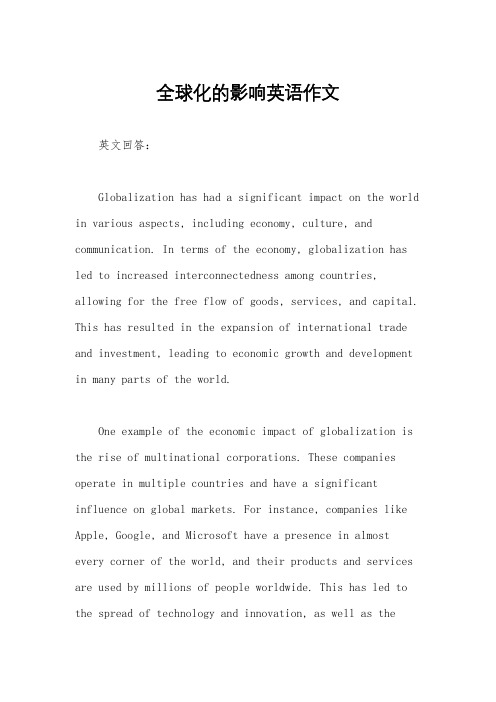
全球化的影响英语作文英文回答:Globalization has had a significant impact on the world in various aspects, including economy, culture, and communication. In terms of the economy, globalization has led to increased interconnectedness among countries, allowing for the free flow of goods, services, and capital. This has resulted in the expansion of international trade and investment, leading to economic growth and development in many parts of the world.One example of the economic impact of globalization is the rise of multinational corporations. These companies operate in multiple countries and have a significant influence on global markets. For instance, companies like Apple, Google, and Microsoft have a presence in almost every corner of the world, and their products and services are used by millions of people worldwide. This has led to the spread of technology and innovation, as well as thecreation of job opportunities in different countries.In terms of culture, globalization has led to the exchange and spread of cultural practices, beliefs, and values. This can be seen in the global popularity of music, movies, and fashion from different parts of the world. For example, K-pop from South Korea and Bollywood movies from India have gained international recognition and have fans from various countries. This has led to a greater appreciation and understanding of different cultures andhas contributed to the diversity of cultural expressions worldwide.Another impact of globalization is the ease of communication and information exchange. With the advent of the internet and social media, people can now connect with others from different parts of the world instantly. Thishas led to the sharing of ideas, knowledge, and experiences, and has facilitated cross-cultural understanding and collaboration. For example, I have friends from different countries whom I met online, and we are able to share our experiences and learn from each other despite beingthousands of miles apart.中文回答:全球化对世界各个方面产生了重大影响,包括经济、文化和交流等。
英语全球化的影响以及对中国大学英语教学的启示

英语全球化的影响以及对中国大学英语教学的启示论文摘要:当今世界,随着全球化趋势的不断增强,英语在成为一门世界性语言的同时,也不可避免地出现了各种新的变化和发展。
在这种新形势下,我国的大学英语教学也应重新审视一系列标准及目标,采取正确的对策。
论文关键词:英语教学,全球化自20世纪以来,随着全球在经济、政治、文化等各方面的联系呈现出爆发式的增长,英语已经发展成为当今世界的主导性语言。
据MacAmmr1998年的统计,以英语为母语或第一官方语言的国家和地区有36个,以英语为母语的人口已达到3.8亿人;以英语作为第二语言的国家和地区有57个,人口大约有2.5亿;以英语作为外语的国家和地区有139个,在这些国家和地区大约有10亿人在学英语,其中的17个国家和地区英语事实上相当于第二语言。
此外,全世界还有20亿人接触英语。
无可争议,无论从国际化的角度还是从全球化的角度,它都早已成为一门世界性的语言,是世界上不同国家、不同民族之间进行交流的重要工具。
而英语全球化给英语自身及各国语言带来了巨大变化,也对各国的英语教育教学提出了许多新的问题。
一、英语全球化对英语传播以及发展的影响(一)英语本土化、各种英语变体的涌现一些人认为,世界英语应该是一种统一的语言。
但在实际上,世界英语是变异的语言,是允许被改变并能够接受的语言。
出于新的多元文化生活环境的需要,英语使用者根据自身的需要和理解来使用英语,从而使英语呈现出更为丰富的地域文化特色,形成各种新的英语地域变体,表现出特有的价值。
如今,据统计,英语为非母语的人数已经超过了英语为母语的人数,二者的比例为3:1。
英语在世界各地广泛传播的同时也受到当地的语言、文化、习俗等的影响,逐渐变化发展,形成了独具本地特色的各种英语变体(varietiesofEnglish),如南非英语、印度英语、新加坡英语等,这些变体既保持了标准英语的特点又增添了有别于标准英语的某些特征。
美国著名社会语言学家Kachru对于英语在不同国家和地区的分布和使用情况提出了英语的三个同心圈理论(threeconcentriccirclesofEnglish),即英语的世界性传播可以用三个同心圈来表示,它们显示了它在跨语言、跨文化的环境中的传播形式,获得模式和功能领域。
英语作文全球化影响
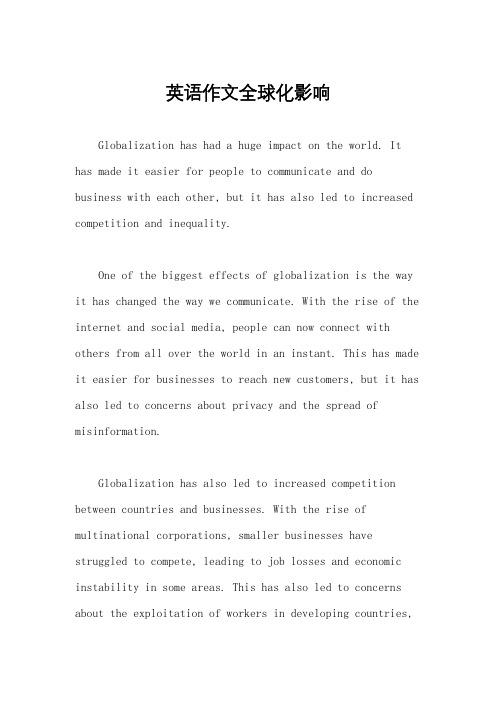
英语作文全球化影响Globalization has had a huge impact on the world. It has made it easier for people to communicate and do business with each other, but it has also led to increased competition and inequality.One of the biggest effects of globalization is the way it has changed the way we communicate. With the rise of the internet and social media, people can now connect with others from all over the world in an instant. This has made it easier for businesses to reach new customers, but it has also led to concerns about privacy and the spread of misinformation.Globalization has also led to increased competition between countries and businesses. With the rise of multinational corporations, smaller businesses have struggled to compete, leading to job losses and economic instability in some areas. This has also led to concerns about the exploitation of workers in developing countries,where labor laws may not be as strict.On the other hand, globalization has also led to increased cultural exchange and diversity. People can now experience different cultures and traditions without leaving their homes, and this has led to a greater understanding and appreciation of the world's diversity. However, it has also led to concerns about the loss of traditional cultures and languages as Western culture becomes more dominant.Overall, the impact of globalization is complex and multifaceted. It has brought many benefits, but also many challenges that need to be addressed. As the world becomes more interconnected, it is important for us to consider the impact of our actions on others and work towards a more equitable and sustainable future.。
英语全球化对语言及文化的影响选题意义

英语全球化对语言及文化的影响选题意义
英语全球化对语言及文化的影响是一个重要的选题,因为它涉及到全球化对国家和社会产生的深远影响。
选择这个选题的意义如下:
1. 文化传播:英语作为全球通用语言,全球化的发展使得英语成为跨国交流和文化传播的重要工具。
了解英语全球化对文化传播的影响有助于我们更好地理解全球化过程中不同文化之间的互动和交流。
2. 文化多样性:英语全球化对世界上其他语言的影响是显著的。
随着英语在全球范围内的广泛使用,一些语言和方言可能会受到冲击,进而导致文化多样性受到威胁。
研究这个选题能够让我们更好地认识到保护和促进文化多样性的重要性。
3. 教育和就业机会:英语全球化对教育和就业机会的影响很大。
全球化使英语成为国际交流和职业发展的重要工具,对于那些掌握英语的人来说,他们能够更容易地获得教育和就业机会。
选题能够让我们更好地了解英语在教育和就业领域的重要性。
4. 跨文化交流:英语全球化促进了不同文化之间的跨界交流。
了解英语全球化对跨文化交流的影响能够帮助我们更好地了解不同文化之间的相互影响和融合。
总之,英语全球化对语言及文化的影响选题具有重要意义,因为它涉及到全球化对社会、经济和文化的影响,有助于我们更好地理解和应对全球化带来的挑战和机遇。
- 1、下载文档前请自行甄别文档内容的完整性,平台不提供额外的编辑、内容补充、找答案等附加服务。
- 2、"仅部分预览"的文档,不可在线预览部分如存在完整性等问题,可反馈申请退款(可完整预览的文档不适用该条件!)。
- 3、如文档侵犯您的权益,请联系客服反馈,我们会尽快为您处理(人工客服工作时间:9:00-18:30)。
Impact of English Globalization on Vernaculars’ Survival 英語全球化對當地語言存續之影響二水國中教師蕭建峻1. Introduction: English Globalization 1. 緒論:英語全球化Because of the influences of former British Empire and the USA’spolitical/economic power, English nowadays is used in a lot of areas around the world. Once called as the “sun-never set country” in the 19th century, the British Empire owned about 1/4 land of the world. At that time, the language of the ruler, the English, was the language chosen for communication between different colonies and within the British Empire. However, the power started shifting from the British Empire to the USA during WWII as the USA became the armory of the whole free world. After WWII, the USA successfully grabbed the opportunity to become the super power of the world in politic and economic stages as the European countries worked hard to recover from the war. While the British Empire and the USA stretched their power to the world, both countries also brought the language, English, to the whole world simultaneously. English now is the official language for more than 80 countries (/wiki/List_of_countries_where_English_is_an_official_langug e 2009) and becomes the most favorite language for international communication.With the globalization of English, English is popular in many fields, such as academy, international political meetings, entertainment, business, and even personal social interaction. (Buck, 2005)In the field of mass media, English is the most favorite language. Take the TV news as an example. CNN and BBC are good choices to get information about the current international news. The possible reasons are not only the giant organization of these two news agencies but also the language CNN and BBC use for spreading news,i.e., English.In the entertainment industry, English has an unparalleled position. In the movie field, Hollywood plays an important role and produces lots of movies every year. Among the movies from Hollywood, most are in English or come with English subtitles. In the music field, having English communication ability seems to be the basic requirement for the artists to compete in the global market. The reason of choosing English is mainly due to its wide acceptability in the world.According to the estimation (Swales, 1987), among all the academic papers published each year, more than 50% were written in English. The more amazing fact is that the percentage of English written papers is still rising year after year. English is preferred to any other language in the field of science and technology. (Crystal, 1997).Besides being used in books, newspaper, academic conferences, and science technology, English is also the main language employed in international settings, e.g., international airports, advertising, and organizations. In international airports, English signals are almost everywhere. Within most international organizations, such as UN, GATT, and NATO, English is usually the first language people employ when interacting with others who have different languages.In all the above cases, English globalization makes English become the international lingual franca for communication. A lingua franca is used as a tool for communication. When two speakers with different first languages want to communicate with each other, each speaker has to choose a common language to make himself/herself understood. The chosen common language is the lingua franca. Currently, the language chosen most often around the world is English (House, 2003). To these people who choose English as the lingua franca, English is used as a tool to achieve something beneficial to their lives, e.g., for making money, job promotion…etc (Mufwene, 2006). However, some people think that such wide uses ofEnglish bring some negative impacts to the world.As a lingual franca, English influences some people’s language choices. According to Melitz (2007), English globalization brings threats to the existence of local languages. Some languages thus have limited space for development which later might result in the extinction. Following the extinction is the loss of cultural identity and integrity (Zealand, 2006). Nevertheless, some languages still successfully keep their positions in specific areas. To explore the situation, two research questions are proposed to discuss the impacts of English globalization on vernacular’s survival.1.Why does English put some vernaculars into extinction in some areas but notin other areas?2.If English is not the killer of some vernaculars, how and why do somevernaculars become extinct without clear personal intervention?2. Negative impacts of English globalization: English as a vernacular killer2. 英語全球化負面的影響:英語成為本土語言的兇手In some contexts, English globalization may pose a great threat to the existence of the vernaculars. According to Swaans’“Q-value”(2001), people usually decide to speak one language that is the most helpful to them to achieve their goals. As the speakers choose English for daily communication, their native languages would be restricted in their development and then would possibly be abandoned. In this way, English could put several languages into extinction.Take the situation in the settlement colonies as an example (Mufwene, 2006). The settlement colonies are the places where the European colonists planned to stay as homes, such as America, Australia, and New Zealand. In these areas, new immigrants brought their own languages and then the languages competed with each other in the new world. Usually, the winner went to the socio-economically dominant language, i.e., English. The reasons are often attributed to new immigrants’ minority in numberand being weak in socio-economic power. Lose in the competition often led to limited space and few occasions for the development of the new immigrants’ languages. Years later, those minority languages were gradually less favored by new immigrants’following generation and sometimes even disdained. With less and less people speaking the minority groups’ languages, their languages were endangered and finally came to extinction in that area.Similar threats are also posed on the Natives in the settlement colonies. Living in the rural and remote area, the Natives usually lead a poorer life than the general population. In order to improve the living conditions, the Natives either accept the modernization or move to the cities. Both methods bring the civilization of the outside world, inclusive of the possible threats to their mother language from English.Most Natives choose to move to the cities to melt into the general life of the country but at the cost of losing their culture at the same time. After moving to the cities where Natives are minority group, the Natives have no choice but to adopt the dominant language, i.e., English, to communicate with the other citizens. Because of little space and few occasions for the mother tongues in the cities, the Natives’children view learning and speaking their mother tongues as unnecessary. Gradually, those minority’s languages are marginalized or even die out in the end (Mufwene, 2003).Outside the settlement colonies, some originally widely-used lingua franca are progressively replaced by English as well (Mufwene, 2006). In Brazil, the favorable foreign language shifted from French to English. Similarly, in terms of international communication, fewer and fewer Francophone countries use French. Instead, more and more Francophone countries choose to use English as their international communicative language. Even in China, the world most populous country, choose to adopt English, instead of the original Russian, as the lingua franca to interact with theother Western countries after the Cold War.From the above cases, it seems that English is like a language killer no matter where it is employed. It is hard for the Natives and the new immigrants to resist the trend of adopting English as the communicative language in the settlement colonies. Even in countries where English is not the dominant language, people also utilize English as the lingua franca for international communication. Overall, the cases seem to demonstrate the fact that as soon as English becomes the dominant language in one area, no other language could survive thereafter.3. Coexistence of English and other languages 3. 英語與其他語言的共存3.1 Examples in Africa 3.1 非洲之例On the contrary, what happened in exploitation colonies, mostly located in Africa, is different from that in settlement colonies (Mufwene, 2006). In exploitation colonies, the rulers are the European colonists. The population of those European colonists is much less than the local people’s. The colonists usually stay in big cities as business managers. Instances of exploitation colonies are South Africa and Zimbabwe.Unlike the situations happening in settlement colonies, the European languages, e.g., French and English, do not claim a complete victory over the vernaculars in the exploitation colonies. Basically, there are two groups existing in the exploitation colonies. The first is the European language speaking group who are small in number but responsible for management of big companies. The other is the major local working group with indigenous lingua franca as their communication tool, e.g., Lingala in two Congos, and Swahili in East Africa.Not to be integrated with the local people, the colonists keep their European languages within themselves and let the local elites learn the European languages. As for the other people in that area, keeping the ethnics identities often makes them loyal to the indigenous languages. So, the situation of two distinctive groups makes thosewho learn the European languages still have to acquire the indigenous languages to communicate with the working group. After all, most social interaction is still in the indigenous languages. In conclusion, European languages are for the higher white collars but the indigenous languages are for the lower working blue collars.Despite of the irreplaceable status of English in business, the local African languages still play an important role in the interaction of local people. Since no overlap between the use of European and the indigenous languages, no competition can be found either. In this way, indigenous languages can survive from the use of the European languages, including English.3.2 Examples in Germany 3.2 德國之例English globalization is not doomed to result in language extinction in Germany, either. House (2003) studied the English use in Germany and conducted three projects, i.e., “Convert Translation”, “communicating in English as a lingua franca”, and “English as a medium of instruction in German universities” to discuss the possible effects of English on German.3.2.1 The project of “Covert Translation” 3.2.1 「隱藏翻譯」計畫In the project of “Covert Translation” (House, 2003), the main focus is on whether the language used along with the English would be changed by the powerful partner, English. With the wide spread of English around the world, a lot of English vocabulary or phrases enter many languages and even replace certain local language usages, especially in the fields of “mass media, advertising, and youth culture”(House, 2003). Some people think that the replacements are only restricted to the lexical level and only affect the systems that are open to the change of lexis. As for “the heart of the lang uage”, the structure would keep intact and unchanged (House, 2003).In the translation field, the tradition is that the norms of the source languages should be modified into the norms of the target languages. Take English and Germanas examples. In the past, those who wanted to translate English literature into German usually chose to modify the norms in the English language into the ones in German. In this way, the readers would feel easier to read the translated articles. However, as English becomes more and more powerful and influential these years, it seems the translators do not always follow the conventions.In order to check if the German translators give in to the English norms during the process of translation, the researcher collected lots of data for later deep analysis. The source of the collected data included 500 texts related to economic, science, and computer information. To make up the short of the written data, several interviews with the editors and translators followed afterwards.With the collected data, the hypothesis about the changes of German norms in translation is not confirmed. Although lots of English words were borrowed into German, the German translation norms in terms of “interpersonal orientation” and “addressee orientation” still differ from the ones in English. Besides, the translators prefer to use “dialectic manner of information presentation” when translating English into German. Similar results were also got from the interview with the editors and translators. In sum, the German norms in discourse change little under the influence of English.3.2.2 The project of “communicating in English as a lingua franca”3.2.2 「英語為通用語」計畫In the project of “communicating in English as a lingua franca”, House (2003) wanted to discuss how speakers with different first languages communicate with one another in English. The participants were international students aging from 25 to 35 in Hamburg University in Germany. The data were collected by recording the participants’ interaction within themselves and sometimes with local German people. Besides, the conductor later also made interviews with the participants as a chance tomake sure the “metapragmatic” strategy usage during the interaction.The first finding of the project is that speakers of different first languages tended to duplicate their conventions of discourses construction into the English discourses. For example, one Indonesian participant always came back to the original topic no matter how far the discourse was away from the starting point. What’s surprising is that this action did not break down the communication. The employed strategy demonstrated the transfers from the participant’s first languages, i.e., “topic recycling”strategy. The topic management strategy, correspondent with the norms in Indonesian, was also double checked in the later interview with the participant.The second finding of the project is the participants’ frequent showing of “solidarity” and “consensus-orientation”. Being classified as non-native ELF speakers, the participants usually helped each other to construct the discourse by finishing speakers’ unfinished sentences or showing agreement. This collaboration is a sign of solidarity especially belonging to the non-native English speakers. Among the Asian participants, they showed a preference to neglect the possible bothersome discourse and refused the “argumentative talk” which might disturb the German participants in understanding. However, to the German participants, their opposition to the refusing “argumentative talk” was another sign of the transfer from the participant’s first language.From the above findings, it is true that the ELF users incorporated some strategies from their L1s when using English in communication. But, in order to make the ELF users communicate more successfully, the ELF users still need to work hard to improve their “pragmatic fluency”.3.2.3 The project of “English as a medium of instruction in German universities”3.2.3 「英語為德國大學授課媒介」計畫In the project of “English as a medium of instruction in German universities”,House (2003) tried to discuss two things at the same time. The first is about the “diglossic situation” of using English in class but employing German in daily life. The second is international students’ perception toward the “diglossic situation” there. In Europe, more and more colleges try to use English as the instructional language to attract more foreign students. Hamburger University is no exception. However, the general public outside the classroom still choose German as the main language for daily communication. Such a “diglossic situation” might have some impacts on international students’ studying motivation and their language choices.The researcher collected the data mainly from class observation, interviews, and recording. In classroom, data were collected from observation of the English use which was followed by retrospective interviews. The following interviews were used for confirmation about the observed situation. Another method is the interviews with the students from overseas. International students had to share their personal view about the “diglossic situation” in Hamburger University. Still another method is to record the real daily life interaction with the Native German speakers.The result showed that international students still preferred German while interacting with German people and used English as a tool for making up their initial shortness in German. At the very first, international students liked to study in “English only” class. However, they wanted the class gradually to be “more German” or “German only” as soon as their language ability allows. The reason for “more German” class is that the international students still need German to survive in the German society. English is a useful instrument to facilitate initial communication, but turned to be a reserved tool for avoiding possible communication difficulties. After all, German is still the language used most often in the society. A gradual movement from “English only” to “more German” is therefore the favorite of the international students.Although all of three previous projects indicate the fact that English influences the German in some aspects, German still successfully keeps its linguistic features and its own living space. In the part of translation, the German norms are still preserved. In the field of ELF, strategies from speakers’ L1s are frequently observed whennon-native English speakers communicate in English. Even in the class where English is used as the language for instruction, students would like to have more German speaking classes. In sum, English truly claims some territory in the former German functioning field. Nevertheless, German still successfully keeps its privilege in specific fields in Germany.3.3 Taiwanese in Taiwan 3.3 台灣的台語English globalization has few impacts on the vernaculars in Taiwan. In atrade-orienting country, Taiwanese pick up English as a tool to communicate with their foreign partners. Students in Taiwan learn English from the third grade of primary school with the aim to acquire the lingua franca as early as possible (Ministry of Education, 2001). But, English learning does not harm the development of vernaculars.Rather, curriculum for supporting the vernaculars is developed as a reaction to the local dominant language, i.e., the Mandarin instead of English (Graddol, 1996; Malzahn, 1997; Mao, 2008).Take the Taiwanese as an example. In Taiwan, Mandarin was highly held as the “national language”. Being favored by political reasons and having united written form, Mandarin is widely accepted and used in Taiwan. The flourishing of Mandarin leads to the limited space for Taiwanese to develop. In the past, kids were even beaten for speaking the vernaculars at school (Malzahn, 1997).However, from Ilan County in 1990, teachers there started to teach the vernaculars at public schools. Later, several other counties followed the step andfinally a complete curriculum related to native culture came into existence. All of these curriculum reforms are reaction to the pressure of Mandarin and can be explained as a process of “identity construction” (Mao, 2008)4. Conclusion 4.結論English often puts other vernaculars into extinction in English speaking areas. For the first research question, the major reason for languages extinction is that English competes with vernaculars or other languages for the same goal no matter for communication or identification. In English speaking areas, English is the only language that people can employ to do things. Thus, without room for developing, the vernaculars and other languages are marginalized and gradually forsaken by their speakers. Finally, extinction of vernaculars comes. The languages of new immigrants and the Natives are victims of English globalization in this way.In contrast, when no competition exists between English and the vernaculars, usually in non-English speaking areas, English is not a threat to the vernaculars then. The reason is that the domain for English usage does not overlap with the one of vernaculars which are used mainly for identification (House, 2003). English is usually chosen as the lingua franca for international communication. So it can be found that English replaces the world language, e.g., French, in Brazil and some Francophone countries (Mufwene, 2006). The reason is that both French and English compete for the same goal: international communication, and there can be only one winner in the competition. (Mufwene, 2006)However, the Portuguese in Brazil and French in these Francophone countries are still kept for communication within the group and even for identity indication. (Mufwene, 2006) Similar things happen to Taiwanese in Taiwan, Lingala in Two Congos, Swahili in East Africa, and German in Germany. All of these local languages are used for inner group communication and group identification. In sum, for thesecond research question, English hardly damages the living space of vernaculars in areas not having English as the first languages. In those places, both English and the vernaculars have complementary different functions and needs.In non-English speaking areas, it is not English but the local dominant languages that kill the minority languages. Taiwanese in Taiwan is the vernacular that is pressed by its strong local dominant language, Mandarin. Although English is highly praised to be helpful for international communication or job promotion, people seldom use English for inner group communication or identification.Still other examples are about vernaculars in Africa. Being not internationalized or being marginalized, vernaculars in sub-Sahara and South Africa still keep their vernaculars as usual. Nevertheless, like Taiwanese, the vernaculars in sub-Sahara (Mufwene, 2003) and South Africa (Mufwene, 2006) are endangered not by English or other Europeans languages, but by their strong local dominant languages.So, the conclusion is that no simple link can be made between English adoption and the extinction of vernaculars. English is not the only one that should be blamed for the extinction of the minority languages. English globalization puts several vernaculars into extinction mainly due to their competing in the same domain. Sometimes, the local dominant languages are the killers of the vernaculars. Since language extinctions can not be avoided, further research might try to study how to stop or slow the speed of extinction to save the diversity of world languages.ReferencesCrystal, D. (1997). English as a global language. Cambridge: Cambridge University Press.Graddol, D. (1996) Global English, global culture? In S. Goodman & D. Graddol (Eds.), Redesigning English: New texts, new identities (pp. 181-238). London: Routledge.House, J. (2003) English as a lingua franca: a threat to multilingualism? Journal of Sociolinguistics 7: 556-578.Kubota, R. (2002). The impact of globalization on language teaching in Japan. In D.Block & D. Cameron (Eds.), Globalization and language teaching (pp. 13–28).London: Routledge.Malzahn, M. (1997) A Far Easter Parallel: The Languages of Scotland and Taiwan.Scotland: the Annual Meeting of the International Conference on the Languages of Scotland and Ulster./ERICDocs/data/ericdocs2sql/content_storage_01/0000019b/80/15/5 0/17.pdfMao, C. J. (2008) Fashioning Curriculum Reform as Identity Politics –Taiwan’s Curriculum in New Millennium. International Journal of EducationalDevelopment.,28(5):585-595 .(SSCI) (NSC 94-2413-H-194-008)Ministry of Education, 2001. The Nine-Year-Integrated Curriculum of Junior High and Elementary Schools: A Temporary Guidelines. Ministry of Education, Taipei (In Chinese).Mélitz, J. (2007) The impact of English dominance on literature and welfare, Journalof Economic Behavior and Organization 64, 193-215.Mufwene, S. S. (2003) Language endangerment: What have pride and prestige got to do with it? In: When Languages Collide: Perspectives on LanguageConflict,Language Competition, and Language Coexistence, ed. by Joseph D.Brian, Johanna Destafano, Neil G. Jacobs, & Ilse Lehiste, 324-345. Columbus: Ohio State University Press.Mufwene, S. S. (2006) Language endangerment: An embarrassment for linguistics.Invited paper presented at the 42nd Regional Meeting of the Chicago Linguistics Society.Swaan, A. D. (2001) Words of the world: The global language system. Cambridge, Polity Press.Swales, J. (1987). Utilizing the literatures in teaching the research paper. TESOL Quarterly, 21, 41-68.Wikipedia, The Free Encyclopedia (2005) [online]. [Accessed 7 June 2009]. Available from World Wide Web:/wiki/List_of_countries_where_English_is_an_official_lan guge。
